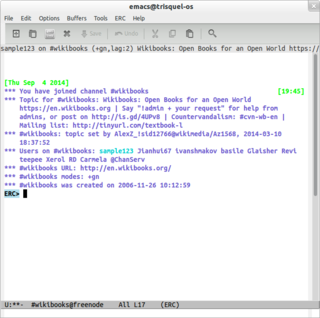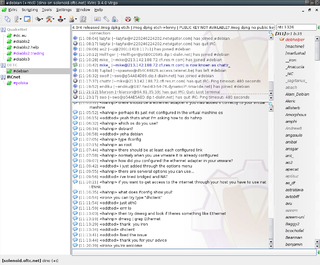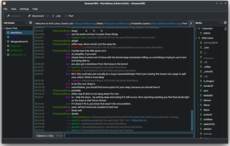
Irssi is an Internet Relay Chat (IRC) client program for Linux, FreeBSD, macOS and Microsoft Windows. It was originally written by Timo Sirainen, and released under the terms of the GNU GPL-2.0-or-later in January 1999.

Internet Relay Chat (IRC) is a text-based chat system for instant messaging. IRC is designed for group communication in discussion forums, called channels, but also allows one-on-one communication via private messages as well as chat and data transfer, including file sharing.
Trillian is a proprietary multiprotocol instant messaging application created by Cerulean Studios. It is currently available for Microsoft Windows, Mac OS X, Linux, Android, iOS, BlackBerry OS, and the Web. It can connect to multiple IM services, such as AIM, Bonjour, Facebook Messenger, Google Talk (Hangouts), IRC, XMPP (Jabber), VZ, and Yahoo! Messenger networks; as well as social networking sites, such as Facebook, Foursquare, LinkedIn, and Twitter; and email services, such as POP3 and IMAP.

Extensible Messaging and Presence Protocol is an open communication protocol designed for instant messaging (IM), presence information, and contact list maintenance. Based on XML, it enables the near-real-time exchange of structured data between two or more network entities. Designed to be extensible, the protocol offers a multitude of applications beyond traditional IM in the broader realm of message-oriented middleware, including signalling for VoIP, video, file transfer, gaming and other uses.
An IRC bot is a set of scripts or an independent program that connects to Internet Relay Chat as a client, and so appears to other IRC users as another user. An IRC bot differs from a regular client in that instead of providing interactive access to IRC for a human user, it performs automated functions.
An IRCd, short for Internet Relay Chat daemon, is server software that implements the IRC protocol, enabling people to talk to each other via the Internet. It is distinct from an IRC bot that connects outbound to an IRC channel.

ERC is an Internet Relay Chat (IRC) client integrated into GNU Emacs. It is written in Emacs Lisp.
NX technology, commonly known as NX or NoMachine, is a remote access and remote control computer software, allowing remote desktop access and maintenance of computers. It is developed by the Luxembourg-based company NoMachine S.à r.l.. NoMachine is proprietary software and is free-of-charge for non-commercial use.

BitlBee is a cross-platform IRC instant messaging gateway, licensed under the terms of the GNU General Public License.
The following tables compare general and technical information between a number of notable IRC client programs which have been discussed in independent, reliable prior published sources.

m23 is a software distribution and management system for the Debian, Ubuntu, Kubuntu Linux, Xubuntu, Linux Mint, elementary OS, Fedora, CentOS and openSUSE distributions.
A home server is a computing server located in a private computing residence providing services to other devices inside or outside the household through a home network or the Internet. Such services may include file and printer serving, media center serving, home automation control, web serving, web caching, file sharing and synchronization, video surveillance and digital video recorder, calendar and contact sharing and synchronization, account authentication, and backup services.
LinuxMCE is a free and open source software platform with a 10-foot user interface designed to allow a computer to act as a home theater PC (HTPC) for the living-room TV, personal video recorder, and home automation system. It allows control of everything in the home, from lighting and climate to surveillance cameras and home security. It also includes a full-featured VoIP-compatible phone system with support for video conferencing.

Empathy was an instant messaging (IM) and voice over IP (VoIP) client which supported text, voice, video, file transfers, and inter-application communication over various IM communication protocols.

Mibbit is a web-based client for web browsers that supports Internet Relay Chat (IRC), Yahoo! Messenger, and Twitter. It is developed by Jimmy Moore and is designed around the Ajax model with a user interface written in JavaScript. It is the IRC application setup by default on Firefox.

WeeChat is a free and open-source Internet Relay Chat client that is designed to be light and fast. It is released under the terms of the GNU GPL-3.0-or-later and has been developed since 2003.

Smuxi is a cross-platform IRC client for the GNOME desktop inspired by Irssi. It pioneered the concept of separating the frontend client from the backend engine which manages connections to IRC servers inside a single graphical application.

Konversation is an Internet Relay Chat (IRC) client built on the KDE Platform and is free software released under the terms of the GNU GPL-2.0-or-later. Konversation is currently maintained in the KDE Extragear Network module, which means that it has its own release cycle which is independent from the main KDE applications. It is the default IRC client in many prominent Linux distributions, such as openSUSE, the KDE spin of Fedora, and Kubuntu.

KVIrc is a graphical IRC client for Linux, Unix, Mac OS and Windows. The name is an acronym of K Visual IRC in which the K stands for a dependency to KDE, which became optional from version 2.0.0. The software is based on the Qt framework and its code is released under a modified GNU General Public License.













